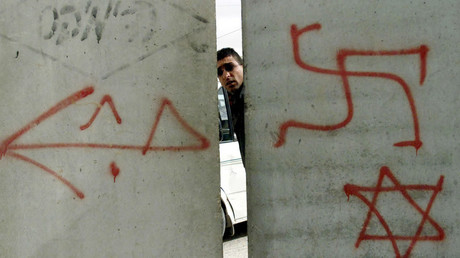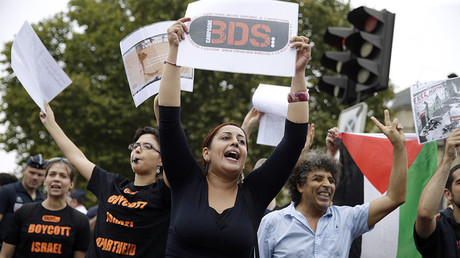Netherlands says calls to boycott Israel allowed under freedom of speech
Calls to boycott Israel are covered by the right to free speech, Dutch Foreign Minister Bert Koenders has announced, upholding the Boycott, Sanctions and Divestment (BDS) Movement’s right to operate in Netherlands despite Israel’s objections.
“Statements or meetings concerning BDS are protected by freedom of expression and freedom of assembly, as enshrined in the Dutch Constitution and the European Convention on Human Rights,” Koenders said during a debate on the Israeli-Palestinian conflict at the Dutch parliament’s Foreign Affairs Committee in The Hague. He was answering questions recently posed by Green Left MP Rik Grashoff concerning Israel’s threats against BDS activists.
The foreign minister stressed that his government still opposes any boycott against Israel, but that support for the BDS movement is a free speech issue and so is legal in the Netherlands.
His words were echoed by the Dutch Ambassador to Israel Gilles Beschoor Plug, who also said the government’s latest decision doesn’t reflect any change in its policy towards Israel, adding that the Netherlands doesn’t support BDS. He also stressed a two-state solution to the Israeli-Palestinian conflict can only be achieved“through dialog and not isolation.”
“As long as what one says is not illegal you are free to say it,”Beschoor Plug said, referring to the BDS activities, as quoted by the Jerusalem Post.
The Dutch government’s move provoked a backlash in Israel as Israeli officials called the announcement “puzzling” and accused the Netherlands of “advocating hatred policy.”
“The statement of the Dutch foreign minister is puzzling and difficult to understand. How can someone on the one hand be against hatred and boycott, but on the other hand justify people who advocate this hatred policy under the guise of freedom of speech?” Israeli Foreign Ministry Spokesman Emmanuel Nachshon told the Jerusalem Post in response to the Dutch government’s move.
Nachshon also said the concept of free speech should be limited. “Once free speech becomes a pretext for allowing hate speech, then it is no longer legitimate,” he said.
The BDS movement representatives declared the Dutch government’s statement a victory. Riya Hassan, Europe coordinator for the Palestinian BDS National Committee (BNC), welcomed the move, calling it “a serious blow” to Israel’s attempts to outlaw the movement.
“Across European civil society, there is a fast spreading recognition of the BDS movement as a legitimate form of nonviolent, grassroots human rights advocacy for the UN-stipulated rights of the Palestinian people,” she added in a statement, urging the EU to “comply with its own policy of non-recognition of Israeli sovereignty in the occupied Arab territories of 1967.”
Israel argues BDS activities fall under the category of hate speech, because by calling to divest and boycott Israel, movement activists seek the destruction of the Jewish state. And so the Israeli government accuses the movement of anti-Semitism.
Israel has so far reacted to the growth of the BDS movement with threats from Israeli Prime Minister Benjamin Netanyahu, a $26-million cyber fighting team and the Foreign Ministry lobbying governments to implement legislation to impede the movement.
In mid-May, Israel also issued a travel ban on the movement’s co-founder Omar Barghouti, who lives in the northern coastal city of Acre in Israel and requires a travel document to move in and out of Israel and Palestine. The move provoked criticism from Human Rights Watch.
In March, Israeli Intelligence Minister Yisrael Katz called for the“targeted civil eliminations” of BDS leaders.
The Netherlands is the second EU country to declare BDS activities a freedom of speech issue after the Swedish Foreign Ministry called BDS “a civil society movement,” stressing that “governments should not interfere in civil society organization views” in March.
In the UK, a number of local councils across the country began boycotting Israeli goods around 2009 in response to Israel’s invasion of Gaza. Jewish Human Rights Watch (JHRW) has recently taken three British councils to the High Court in London, alleging their decision to boycott Israel was discriminative.
Earlier this year, the British government issued guidance to public authorities. It called such boycotts “inappropriate,” as they could “undermine good community relations, poison and polarize debate, weaken integration and fuel anti-Semitism.”
On May 24, a Spanish constitutional tribunal recommended the local municipality of Gijon to scrap a motion it passed in January, in which it declared itself “a space free of Israeli apartheid,” voicing its support for the BDS movement. According to the nonbinding recommendation issued by the tribunal, Gijon’s motion clauses “jeopardize the fundamental right to equality without discrimination on the bases of appearance, ethnicity and religion,” the Jerusalem Post reports.
The BDS movement is also illegal in France, where it is deemed discriminatory.
https://www.rt.com/news/344629-netherlands-movement-boycott-israel/



0 Comments:
Post a Comment
Subscribe to Post Comments [Atom]
<< Home